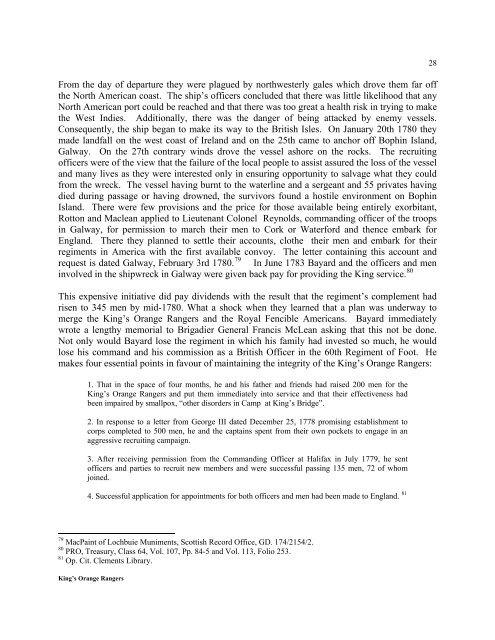You also want an ePaper? Increase the reach of your titles
YUMPU automatically turns print PDFs into web optimized ePapers that Google loves.
From the day of departure they were plagued by northwesterly gales which drove them far off<br />
the North American coast. The ship’s officers concluded that there was little likelihood that any<br />
North American port could be reached and that there was too great a health risk in trying to make<br />
the West Indies. Additionally, there was the danger of being attacked by enemy vessels.<br />
Consequently, the ship began to make its way to the British Isles. On January 20th 1780 they<br />
made landfall on the west coast of Ireland and on the 25th came to anchor off Bophin Island,<br />
Galway. On the 27th contrary winds drove the vessel ashore on the rocks. The recruiting<br />
officers were of the view that the failure of the local people to assist assured the loss of the vessel<br />
and many lives as they were interested only in ensuring opportunity to salvage what they could<br />
from the wreck. The vessel having burnt to the waterline and a sergeant and 55 privates having<br />
died during passage or having drowned, the survivors found a hostile environment on Bophin<br />
Island. There were few provisions and the price for those available being entirely exorbitant,<br />
Rotton and Maclean applied to Lieutenant Colonel Reynolds, commanding officer of the troops<br />
in Galway, for permission to march their men to Cork or Waterford and thence embark for<br />
England. There they planned to settle their accounts, clothe their men and embark for their<br />
regiments in America with the first available convoy. The letter containing this account and<br />
request is dated Galway, February 3rd 1780. 79 In June 1783 Bayard and the officers and men<br />
involved in the shipwreck in Galway were given back pay for providing the King service. 80<br />
This expensive initiative did pay dividends with the result that the regiment’s complement had<br />
risen to 345 men by mid-1780. What a shock when they learned that a plan was underway to<br />
merge the King’s <strong>Orange</strong> <strong>Rangers</strong> and the Royal Fencible Americans. Bayard immediately<br />
wrote a lengthy memorial to Brigadier General Francis McLean asking that this not be done.<br />
Not only would Bayard lose the regiment in which his family had invested so much, he would<br />
lose his command and his commission as a British Officer in the 60th Regiment of Foot. He<br />
makes four essential points in favour of maintaining the integrity of the King’s <strong>Orange</strong> <strong>Rangers</strong>:<br />
1. That in the space of four months, he and his father and friends had raised 200 men for the<br />
King’s <strong>Orange</strong> <strong>Rangers</strong> and put them immediately into service and that their effectiveness had<br />
been impaired by smallpox, “other disorders in Camp at King’s Bridge”.<br />
2. In response to a letter from George III dated December 25, 1778 promising establishment to<br />
corps completed to 500 men, he and the captains spent from their own pockets to engage in an<br />
aggressive recruiting campaign.<br />
3. After receiving permission from the Commanding Officer at Halifax in July 1779, he sent<br />
officers and parties to recruit new members and were successful passing 135 men, 72 of whom<br />
joined.<br />
4. Successful application for appointments for both officers and men had been made to England. 81<br />
79<br />
MacPaint of Lochbuie Muniments, Scottish Record Office, GD. 174/2154/2.<br />
80<br />
PRO, Treasury, Class 64, Vol. 107, Pp. 84-5 and Vol. 113, Folio 253.<br />
81<br />
Op. Cit. Clements Library.<br />
King’s <strong>Orange</strong> <strong>Rangers</strong><br />
28


